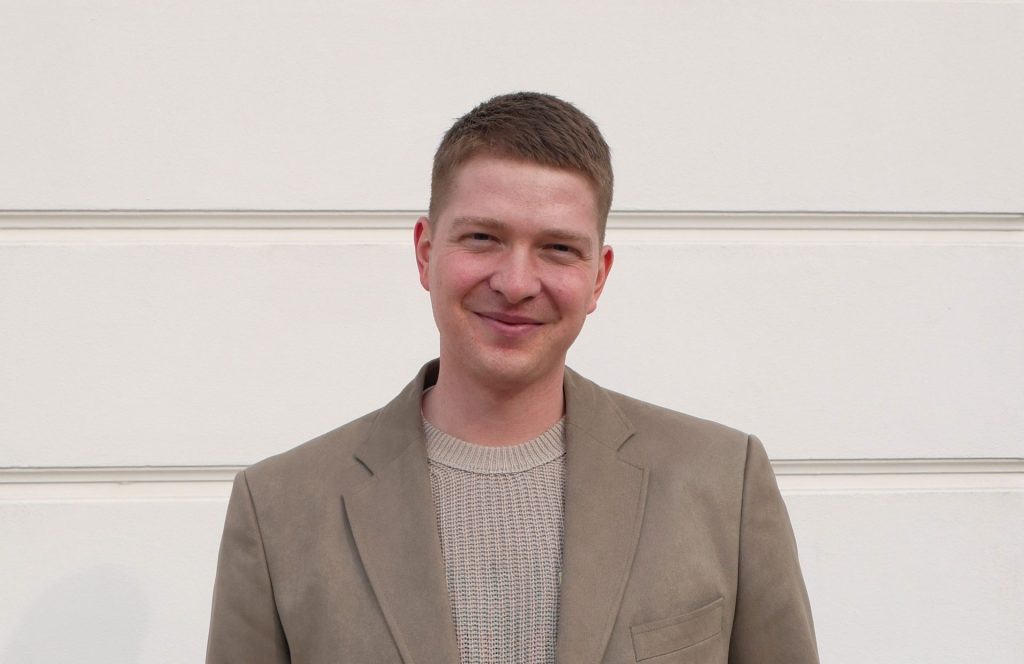Tim Senkbeil is a PhD-researcher in the IRTG “Baltic Peripeties. Narratives of Reformations, Revolutions and Catastrophes”. He is currently working on the narration and construction of time in German literature dealing with 1989 and the aftermath.
Tim Senkbeil

University of Greifswald
IRTG Baltic Peripeties
Anklamer Str. 20
17489 Greifswald
Germany
Room: 0.09
+49 3834 420 3598
tim.senkbeil[at]uni-greifswald.de
Time and the Construction of Time in German Literature Dealing with 1989 and the Aftermath
A central turning point in recent German history is the so-called ‘Wende’ of the years 1989 and 1990. The fall of the Berlin Wall, the months until the official German reunification as well as the aftermath of collapsing communism have been repeatedly narrated in literature. Particularly the realistic perception of this period as a fundamental change experienced by everyone is reflected in the way the narrations are constructed. Time is of particular importance here, as Carola Hähnel-Mesnard (2022) states: “[The] rupture experienced in the real world is expressed […] in different ways through the narrative representation of a particular perception of time.”
While research has so far focused on the thematic aspects of these texts, this particular project is dedicated to a formal aspect which focusses on the construction of time (Zeitgestaltung). The project will primarily examine how the construction of time relates to the narrative of the radical changes happening 1989 and its aftermath. This approach will direct the analysis towards time references and the thematization of time in these texts, focusing constructions that have been overlooked so far. Secondly, by examining various texts published since the 1990s, the aim is to elaborate the extent to which the construction of time has changed in a diachronic comparison.
Remarkably, the construction of time can be described as a ‘loss of time’. This loss of time is often accompanied by an entry into a new temporalities, which the construction of time is emphasizing as well. Through the succession of deconstruction and reconstruction of the temporal order, the construction of time refers to an interim period, which can be read as a phase of transition, makes the texts formally recognizable as narratives of change and refers in a literal sense to the historic ‘Wende’.
- “Time and the Construction of Time in German Literature Dealing with 1989 and the Aftermath,” international workshop Resonant Conflicts. Turning Points in the Baltic Sea Region, organised by the IRTG Baltic Peripeties. Narratives of Reformations, Revolutions and Catastrophes, Department for Language and Literature, NTNU Trondheim, May 22-24, 2024.
- “Zeit und Zeitgestaltung in der deutschsprachigen Wendeliteratur,” presentation of the doctoral project with focus on Angela Krauß’ narration Die Überfliegerin at the Kolloquium für Neuere Deutsche Literatur, organised by Prof. Dr Eckhard Schumacher, University of Greifswald, January 31, 2024.
- “Zeit und Zeitgestaltung in der deutschsprachigen Wendeliteratur,” presentation at the Forschungscolloquium Gegenwartsliteratur, Alfried Krupp Institute for Advanced Study Greifswald, February 23-24, 2023.
University studies and degrees
- Since April 2024
- Doctoral Researcher at the International Research Training Group “Baltic Peripeties. Narratives of Reformations, Revolutions and Catastrophes” at the Modern German Literary Studies, Department of German Philology, University of Greifswald.
- Since 2022
- Doctoral Student at the University of Greifswald.
- 2016 – 2022
- Erstes Staatsexamen (First State Examination) in German, History and Swedish at the universities of Greifswald and Lund.
Professional background
- 2022 – 2024
- Research assistant at the Wolfgang-Koeppen-Archiv, Departement of German Philology, University of Greifswald.
- 2021
- Student assistant at the Chair of Nordic History, University of Greifswald.
- 2018 – 2021
- Tutor at the Department of German Philology, University of Greifswald.
- 2018 – 2019
- Student assistant at the Chair of Early Modern History, University of Greifswald.
Teaching
- 2018 – 2021
- Tutor for Modern German Literature, Department of German Philology, University of Greifswald.